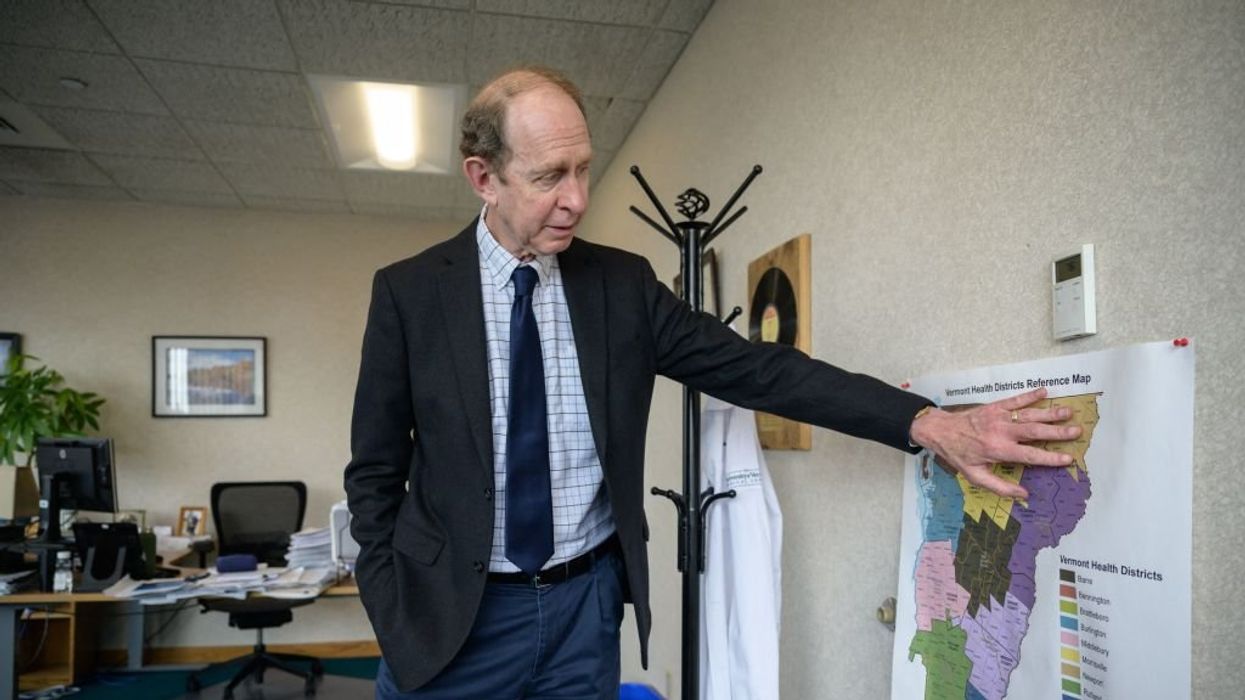
Vermont health commissioner Mark Levine. (Photo by ED JONES/AFP via Getty Images)

Health officials are looking to cure the English language of what leftists believe ails it.
The Vermont Department of Health issued a caution this week not to use the words "son" and "daughter," insinuating that a failure to do so may cultivate unhealthy learning environments.
In a Facebook post shared to its official page Wednesday, the department (VDH) — run by Mark Levine, who was appointed commissioner by Republican Gov. Phil Scott — stated, "Many families and students are getting ready for the new school year. Equity in the classroom is an essential piece of a productive and healthy learning environment."
"When talking about family, it's important to use terms that cover the many versions of what family can look like," said the post.
Accompanying the post was an image titled, "Inclusive Language for Families," which contained instructions on how Vermonters should adjust their vocabularies and mindsets.
According to the VDH, which states elsewhere that "gender is socially constructed," Vermonters should "[u]se 'child or 'kid' instead of 'daughter' or 'son'" because these substitutes are "gender-neutral and can describe a child who may not be someone's legal son or daughter."
In addition to abandoning the centuries-old terms linked, respectively, to the Old English sunu for "male child in relation to either or both parents" and the Old English dohtor for "female child considered with reference to her parents," the VDH urged the sons and daughters of the Green Mountain State to say "family members" rather than "household members" because "not all families live in the same home — think divorced or incarcerated parents, stepsiblings, etc."
'Challenging our instinct or bias to prioritize the needs of white, straight, cisgender, and non-disabled and neurotypical students is the first step.'
Blaze News reached out to the VDH inquiring about what prompted the posting as well as whether there was any scientific basis to its insinuation that the use of the terms "son" and "daughter" was harmful. The department did not provide a response by deadline.
The VDH post seeking further severance of language from biological and conventional meaning was subject to immediate backlash, prompting the department to follow up on Facebook with a message claiming, "This post was intended to encourage using inclusive language when you don't know someone's family situation. This is especially important in settings like classrooms, afterschool programs and sports teams."
"Using language that includes everyone helps children feel seen, respected, and valued no matter how their families are structured," wrote the department, adding a link to a department page about "health equity."
According the department, health equity:
exists when all people have a fair and just opportunity to be healthy, especially those who have experienced socioeconomic disadvantage, historical injustice, and other avoidable systemic inequalities that are often associated with social categories of race, gender, ethnicity, social position, sexual orientation and disability.
The VDH's health equity page indicates why an organization that might otherwise assign greater focus to the local fallout of the opioid epidemic or alarmingly high STD rates is now pestering Vermonters about how they describe their children.
In the interest of "culturally and linguistically appropriate care," the VDH has integrated the National Standards for Culturally and Linguistically Appropriate Services in Health and Healthcare (CLAS Standards) in all of its work.
The National CLAS Standards were developed by the U.S. Department of Health and Health and Human Services' Office of Minority Health in 2000.
The standards call for public organizations to "establish culturally and linguistically appropriate goals, policies, and management accountability, and infuse them throughout the organization’s planning and operations" as well as to "[partner with the community to design, implement, and evaluate policies, practices, and services to ensure cultural and linguistic appropriateness."
Adherents to the standards are expected to learn about various cultural identities, combat bias, respect others' values and communication preferences, and adapt their services to various persons' cultural needs.
The Christian Post noted that in its latest "Health Equity Update," the VDH provides additional tips on how Vermonters help with their leftist social engineering.
The newsletter states, "Supporting the needs, backgrounds, and abilities of all students is a complex task. Challenging our instinct or bias to prioritize the needs of white, straight, cisgender, and non-disabled and neurotypical students is the first step. This will reduce barriers for BIPOC and LGBTQIA+ students as well as those with physical and neurological disabilities."
In addition to de-prioritizing the needs of students hailing from that racial demographic, which makes up around 91% of the state's population, the health organization echoes CLAS literature, stressing that teachers, coaches, "afterschool school providers," and mentors should reflect on their own beliefs and "become more conscious of issues related to racial equity and gender equity."
The VDH is hardly the first institution to urge Americans to drop words leftists believe are offensive or antiquated.
Stanford University, for instance, released an index of "harmful words" in 2022 that it indicated would be eliminated from use and its websites. These words included: "addict," "American," "ballsy," "Brave," "chief," "gentlemen," "he," "straight," "master," and "white paper."
The New Hampshire Journal highlighted how earlier this year, New Hampshire Gov. Chris Sununu's (R) Department of Information Technology shared a memo claiming the words "citizen," "guys," "he or she," "man-made," "handicapped," "normal," and "elderly," were problematic, exclusionary, and/or harmful.
Like Blaze News? Bypass the censors, sign up for our newsletters, and get stories like this direct to your inbox. Sign up here!